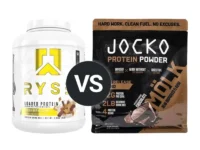Knowledge BaseYou're Questions Answered
How long does it take to see results from using protein powder?
The timeline for seeing results from using protein powder varies depending on individual factors, including exercise habits, dietary choices, and overall fitness goals. Protein powder is not a magic solution but rather a supplement that can enhance muscle growth, aid recovery, and assist with fat loss when used as part of a balanced diet and consistent exercise routine.
Muscle Growth and Recovery
For those using protein powder to build muscle, results can often be observed within six to twelve weeks when combined with regular resistance training1. Protein, especially from high-quality sources such as whey or casein, provides the amino acids necessary for muscle repair and hypertrophy. The increase in muscle size, or hypertrophy, doesn’t occur immediately— it typically takes at least a few weeks of consistent training and adequate protein intake to see physical changes2. Protein powder helps maximize these gains by ensuring that your muscles are supplied with the building blocks they need for repair and growth after each workout.
In the early stages of resistance training, beginners might notice faster results due to the body’s initial adaptation phase, sometimes referred to as “newbie gains.” During this period, the body is highly responsive to the stimulus of strength training, leading to noticeable increases in strength and muscle size within a few weeks3.
Weight Loss
Protein powder can also be a useful tool for those looking to lose weight, as it supports muscle maintenance while promoting fat loss. Protein’s ability to increase satiety (feelings of fullness) and boost metabolism via the thermic effect of food (TEF) helps in reducing overall calorie intake4. The time it takes to see weight loss results from using protein powder will vary based on your caloric deficit, exercise routine, and the amount of protein consumed. Typically, a healthy rate of weight loss is about 1 to 2 pounds (0.5 to 1 kg) per week, and results can be seen in as little as a few weeks when protein powder is incorporated into a well-structured diet5.
It’s important to note that protein powder itself will not directly cause weight loss unless it’s part of a calorie-controlled diet. While protein can help preserve muscle mass during fat loss, overall energy balance (calories in vs. calories out) is what ultimately drives weight loss. Protein powder is most effective in this context when combined with regular exercise and a reduction in calorie intake6.
Endurance and Performance Improvements
Athletes and those focused on endurance may also see performance improvements when using protein powder. Protein, alongside carbohydrates, plays a vital role in muscle repair, recovery, and glycogen replenishment, helping to support sustained energy levels and reduce muscle fatigue after endurance activities7. Although improvements in endurance and performance are typically more gradual than muscle growth, incorporating protein powder can help support consistent gains in stamina and reduce recovery time after long or intense exercise sessions.
Factors That Influence Results
The time it takes to see results from protein powder also depends on individual factors, such as:
- Diet: The overall quality and balance of your diet significantly impact how quickly you see results. Adequate calorie intake, macronutrient balance, and micronutrients all play roles in recovery, muscle growth, and fat loss.
- Exercise Routine: The type, intensity, and frequency of your workouts will affect how quickly you notice changes. Resistance training, in particular, accelerates muscle growth when combined with sufficient protein intake.
- Protein Type: The type of protein powder (whey, casein, soy, pea, etc.) can influence absorption rates and effectiveness. For instance, whey protein is rapidly absorbed, making it ideal for post-workout recovery, while casein is slower-digesting, offering prolonged amino acid delivery8.
- Consistency: Regular, consistent use of protein powder as part of your diet and fitness routine is essential for seeing results. Sporadic use or inconsistent training will slow progress.
Setting Realistic Expectations
It's essential to maintain realistic expectations when using protein powder. While it can provide significant benefits in muscle building, fat loss, and recovery, it is not a quick fix. Results are best achieved when protein powder is used as a supplement to a balanced diet and consistent exercise program. Additionally, factors such as genetics, age, and individual metabolic rates can all influence the timeline for visible results.
Ultimately, consulting with a nutritionist or fitness professional can help tailor protein intake and exercise to your specific goals, ensuring that you make the most of your protein supplement and see results in a sustainable and healthy manner.
- Damas, F., Phillips, S. M., Vechin, F. C., & Ugrinowitsch, C. (2015). Early resistance training-induced increases in muscle cross-sectional area are concomitant with edema-induced muscle swelling. European Journal of Applied Physiology, 115(1), 49-56.
- Moore, D. R., Robinson, M. J., Fry, J. L., Tang, J. E., Glover, E. I., Wilkinson, S. B., ... & Phillips, S. M. (2009). Ingested protein dose response of muscle and albumin protein synthesis after resistance exercise in young men. The American Journal of Clinical Nutrition, 89(1), 161-168.
- Grgic, J., Lazinica, B., Schoenfeld, B. J., & Pedisic, Z. (2017). Resistance training frequency and skeletal muscle hypertrophy: A review of available evidence. Journal of Science and Medicine in Sport, 21(7), 769-778.
- Leidy, H. J., Clifton, P. M., Astrup, A., Wycherley, T. P., Westerterp-Plantenga, M. S., Luscombe-Marsh, N. D., ... & Mattes, R. D. (2015). The role of protein in weight loss and maintenance. The American Journal of Clinical Nutrition, 101(6), 1320S-1329S.
- Hébert-Losier, K., Zinner, C., Platt, J., & Stöggl, T. (2015). Evidence-based nutrition and hydration advice for runners. In E. P. Pitsiladis & Y. E. Pitsiladis (Eds.), Routledge Handbook of Sports Nutrition and Hydration (pp. 309-318). Routledge.
- Hector, A. J., & Phillips, S. M. (2018). Protein recommendations for weight loss in elite athletes: A focus on body composition and performance. The International Journal of Sport Nutrition and Exercise Metabolism, 28(2), 170-177.
- Churchward-Venne, T. A., Burd, N. A., & Phillips, S. M. (2012). Nutritional regulation of muscle protein synthesis with resistance exercise: strategies to enhance anabolism. Nutrition & Metabolism, 9(1), 40.
Related Questions
Related Reviews
Protein vs Protein
Your Answer
We are a participant in the Amazon Services LLC Associates Program, an affiliate advertising program designed to provide a means for us to earn fees by linking to Amazon.com and affiliated sites.

